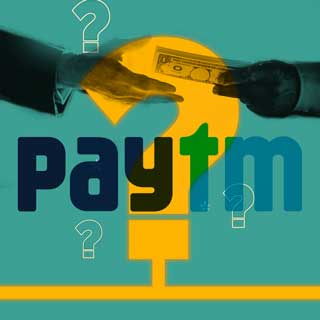On 31st January, 2024, the governing body of banking industry, the Reserve Bank of India (RBI) issued a ban on Paytm Payments Bank Ltd. (PPBL). The ban is applicable on all kinds of Paytm transactions such as wallets, FASTags, top-ups, prepaid instruments deposits in customer accounts, National Common Mobility Cards (NCMC) and any operations included in Paytm Payments Bank. The ban will take effect from 29th February, 2024. This was a shocking news for all businesses and consumers across the country. Even the stocks fell by 40% in the market.
What exactly did PPBL do, to get banned? Take note, this is a BIG Mistake on part of Paytm Payments Bank Ltd. which was about not following KYC Norms. It was reported that around 1000 Paytm Payments Bank accounts were opened on only one PAN Card. Such fraudulent mannerisms are an act of money laundering. It clearly indicates how intricately one account was used for crores of transactions. The meaning of money laundering not only means hoarding of cash illegally but also disguising the financial assets. To put it in simple terms, it is a criminal activity of various financial transactions being portrayed as money received through legal source. So, improper methodologies being used in a transaction is termed as money laundering. Thus, we can term Money Laundering as a method of placement whereby cash is broken into smaller deposits of money and is a process of Bulk cash smuggling. This involves physically smuggling cash to another jurisdiction and depositing it in a financial, Cash-intensive businesses. This is how PPBL came under the scanner of money laundering and a stringent ban was imposed on them.
However, not following the KYC norms was not the only mistake PPBL made but they carried out illegal transactions despite RBIs warnings. Also note that, a transaction will be considered illegal if non-compliance is visible on a company’s records. Paytm, in this case, has been on the far end of the rope which makes its activities clearly fraudulent. Reports of using its dormant accounts for money laundering are revealed by RBI. Even the Enforcement Directorate (ED) was alerted by RBI about such unsolicited activities. Although, reports on any probe has not been announced yet, we can say that RBI’s ban on Paytm was to protect Consumers Interest.
Now that we know why Paytm came under money laundering scanner. What should a consumer do under such circumstances, considering the fact that the number of days to manage e-wallets and other transactions are very less. Soon after the ban was issued on Paytm, the company released an update to its customers saying that will expand its business ties with other banks. Also, that their services will be continued as hitherto.
With such a notice laid out by the company, should we be relaxed or worried about what comes next? From RBI’s point of view as also the various reports released, we cannot clearly determine if things will be soothing. So, we cannot fully rely on the company’s notice till the last moment. In such cases, the Consumers should first make arrangements for securing their earnings. Secondly, they should choose other means of wallet or UPI payment transactions. c. For example, we have the Government initiated app viz., BHIM vis-a-vis all banks have their individual mobile banking apps and UPI services which are easy to operate. The most such common apps are GPAY, PhonePe, Amazon Pay etc. With so many alternate options on hand, consumers need have no fear, about transacting banking business online.
However, let us wait till 29th February, 2024 and watch for the Regulator’s further action in the matter.






